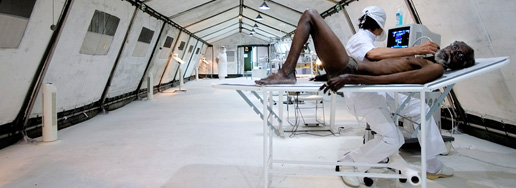Le Préau d'un Seul
Jean Michel Bruyère / LFKs [France]

Performing Arts Festival launching from Tokyo
Confronting head-on the issue of the roughly 240 immigration camps scattered around Europe, this installation-style theatre work has previously appeared at numerous international festivals, with its striking approach earning both praise and controversy. Now Jean-Michel Bruyère at last brings the unforgettable "Le Préau dʼun Seul" to Japan.
LFKs features poets, actors, composers, philosophers, ethnologists and even doctors, an artistic collective crossing borders of genre, expertise and nationality. In this creation the group simultaneously insightfully leads audiences to ideas and perception on the realities of immigration that the media cannot convey, while also functioning as a form of political activism towards the present through artistic actions.
The installation is composed of several parts that utilize all the spaces of the Nishi-Sugamo Arts Factory, including a performance inside a tent that evokes an immigrant camp, and the installation, "Le Chemin de Damastes" (The Path of Damastes), with animated beds, as well as a new part created during the companyʼs time in Tokyo.
Audiences will experience the "Le Préau dʼun Seul" (The Courtyard of One) by moving through the venue according to a decided route, entering and leaving any time they wish, and creating a unique cognitive space that uses all the senses to the full.
Franceʼs population was greatly reduced due to the human cost of the First World One, as well as due to a birth rate that started to decline from the latter half of the nineteenth century; now the country accepts large numbers of immigrants. In particular, during the cheap labour-demanding "glory 30 years" (1945-1975) of economic growth after the end of World War Two, there was mass immigration from Spain, Portugal and northwestern African nations (especially Algeria). Many of the immigrants worked as coal miners and car manufacturing workers, supporting the economic growth.
However, following the 1974 oil crisis, suddenly the administration at the time closed the borders and decided to suspend accepting economic migrants. The background to this was not only the situation caused by the oil crisis, but also the new social problems arising from poorly paid workers being fixed only as foreign workers, the appalling state of the workersʼ residential areas, and worker strikes.
As the demand for immigrant labour decreased due to the recession, immigrants became recognized not as necessary "workers" for France but rather as an "alien" element in society. The government started an incentive scheme in 1976 to encourage the immigrants to leave, paying all voluntary repatriates 10,000 francs (around ¥200,000) to persuade them to go home. However, this had no effect and the number of immigrants continued to rise.
Recently immigrants in Europe are purported to make up just 1.6% of the population of the EU. Nonetheless, the former French President Sarkozy launched an immigrant selection policy in 2008, denying settlement to 73% of immigrants. The result was the increase of "detention camps" where people with nowhere to go would reside temporarily. In 2009, the goverment announced the deportation of 27,000 illegal immigrants, fuelling right-wing tendencies in the population. The oppressed immigrants are at present exposed to atrocious conditions where their human rights are ignored, where they are unprotected by the courts, forcibly arrested and detained. Contradicting the fundamental principles of democracy that says all members of the population have sovereign rights, here in this discriminatory society can we witness the current state of Europe.